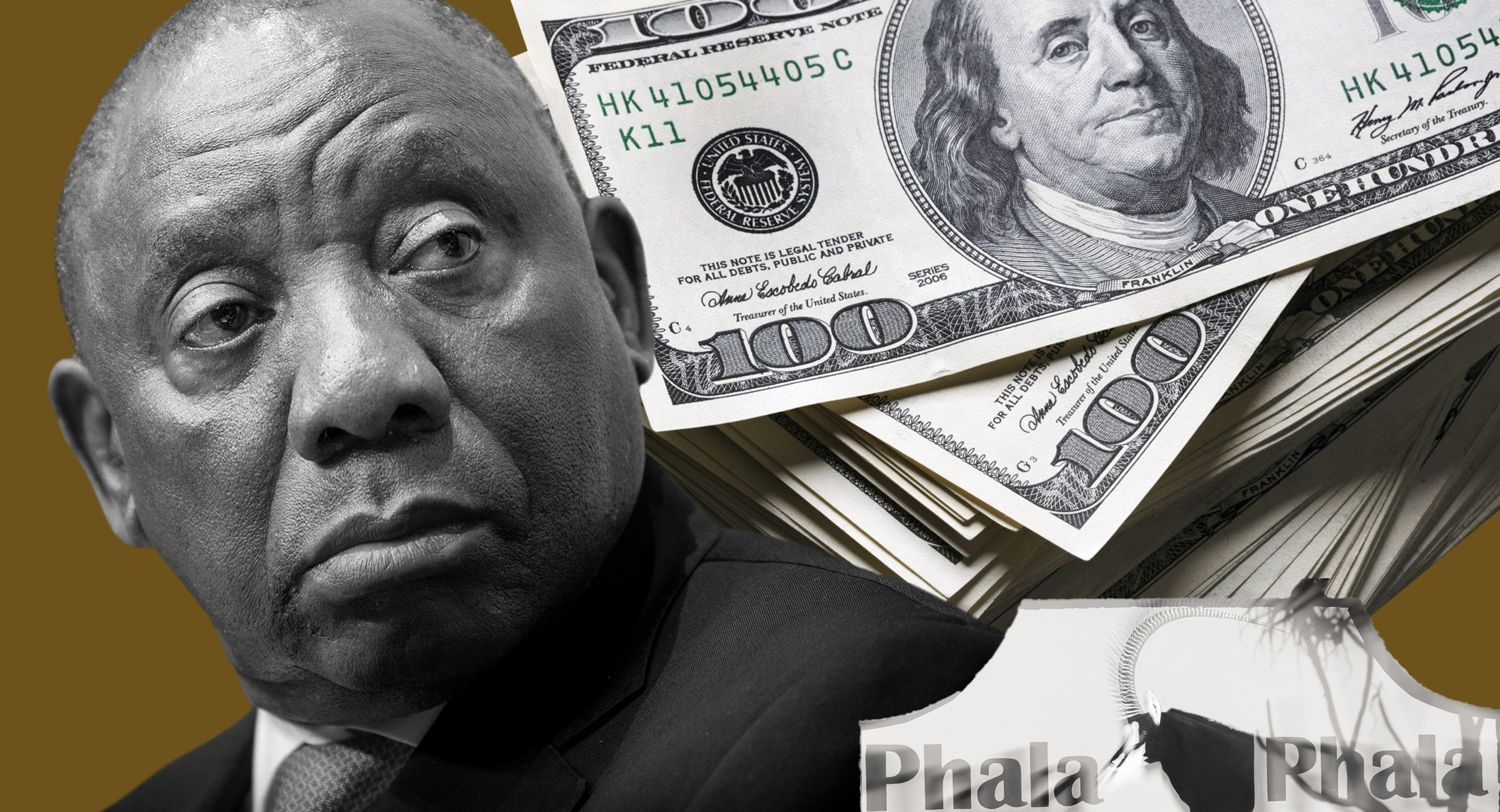Hours before $580,000 (about R8-million at the time) in cash vanished from President Cyril Ramaphosa’s Phala Phala farm in February 2020, burglars struck a neighbouring property, stealing only cushions.
This emerged on Wednesday, 1 October in the Modimolle Regional Court, where the neighbouring farm’s former owner, whom the court ordered cannot be named, testified that there was a burglary at his house on 9 February 2020.
The witness told the court that on that day, he received a call from the farm management saying they thought there had been a break-in at the house.
He drove to the farm, where he saw that a window had been broken. He then viewed CCTV footage, which “showed a couple of guys coming in”.
“I then asked the manager to open a case [with the police] but we couldn’t find anything that was missing in the house [other than cushions],” he told the court.
The State argues the accused broke into the wrong property before executing the Phala Phala robbery later that evening, where the money was stolen from a couch in which it had been hidden.
Witnesses turn cold
Before the farmer’s testimony, the court heard from two other witnesses, whom the court ruled also cannot be named. They are said to have transported the three suspects on trial for the robbery at Ramaphosa’s farm: the alleged mastermind, Imanuwela David, and siblings Floriana and Ndilinasho Joseph.
Floriana Joseph was employed as a temporary cleaner at the Phala Phala farm at the time of the robbery.
Read more: Phala Phala cash heist – Who knew what and when?
The three Namibian nationals face charges of conspiracy to commit housebreaking with intent to steal and theft, two counts of housebreaking with intent to steal and theft, and, in David’s case, an additional charge of money laundering.
/file/dailymaverick/wp-content/uploads/2025/10/IMG_3128.jpg)
The two “transporters” are said to have taken the trio to various destinations over several days, including from Phala Phala after the robbery to a casino and car dealerships in Johannesburg.
One transporter originally told police he was paid $30,000 in three bags, with $10,000 from each accused, for transporting them. But in court on Wednesday, he denied this version, claiming he had been given only R7,000 to transport the trio from Limpopo to Johannesburg and that he was “afraid” when making his original statement.
Prosecutor Nkhetheni Munyai attempted to have him declared a hostile and uncooperative witness due to the contradictions, but the defence dismissed the application as “a last kick of a dying horse” and “desperate”. The magistrate ruled against the State.
The second transporter also contradicted himself. While he admitted in court that he knew the Joseph siblings, he sought to downplay his connection to David, despite earlier telling police they had worked together in the security industry.
Beyond denying links with David, he further claimed the police had forced him to sign his statement.
Munyai, however, later confronted him with allegations that months after the robbery he had sought help from a man known as Hasim to exchange US dollars worth R140,000.
“The only reason you could be with Hasim was so he could assist you with changing the US dollars,” argued the prosecutor.
The State asked for him to be declared a hostile witness.
“Some of the evidence may be true. Some may be false, but the totality of the evidence will be considered at the end of the trial when the court is to give a judgment. For that reason, the application by the State is granted,” said magistrate Peter Manthate.
The application allows the State to cross-examine the witness.
Read more: Ramaphosa’s Farmgate scandal – a timeline of what we know (and don’t know) so far
Unanswered questions
Wednesday’s court proceedings began nearly an hour later due to a witness’s tardiness. Manthate did not hide his unhappiness about this, expressing a strong desire to conclude the case.
“We still have a long way to go,” he warned, urging the investigating officer to prepare witnesses in advance so the trial could move faster.
Although the shaky testimony has dented the prosecution’s case, it is far from over. Fifteen more witnesses are expected to take the stand.
The State will argue that David and Floriana Joseph’s lives “dramatically” changed after the heist, and will present cellphone records to show the accused coordinated their movements across provinces to commit the Phala Phala crime.
The defence, preparing to call five witnesses, will attempt to dismantle that version.
Previously, Daily Maverick reported on the testimonies of Ramaphosa’s Phala Phala housekeeper and the acting farm manager, both of whom raised more questions than answers.
The acting manager testified that on 25 December 2019, he received $580,000 in cash from a businessman for the sale of 20 buffaloes, an unusual transaction for which he did not issue an invoice, but drafted a receipt, which he later placed in a safe. The animals were, however, not taken that day.
Questions remain, such as: Who authorised R8-million in foreign currency to be hidden in a couch? Why wasn’t the theft reported immediately? What did the President know, and when?
Ramaphosa’s Phala Phala manager told the court that on 26 December 2019, when Ramaphosa briefly stopped at the farm en route to Cape Town, he informed him of the transaction.
The trial is set to continue on Friday, 3 October, with expectations that it will shed further light on what transpired inside the President’s farm, and what Ramaphosa himself knew, authorised or failed to act upon. DM




 Illustrative image | Sources: President Cyril Ramaphosa. (Photo: Jaco Marais / Gallo Images) | US dollars. (Photo: iStock) | President Cyril Ramaphosa’s Phala Phala farm in Limpopo. (Photo: Leon Sadiki)
Illustrative image | Sources: President Cyril Ramaphosa. (Photo: Jaco Marais / Gallo Images) | US dollars. (Photo: iStock) | President Cyril Ramaphosa’s Phala Phala farm in Limpopo. (Photo: Leon Sadiki)